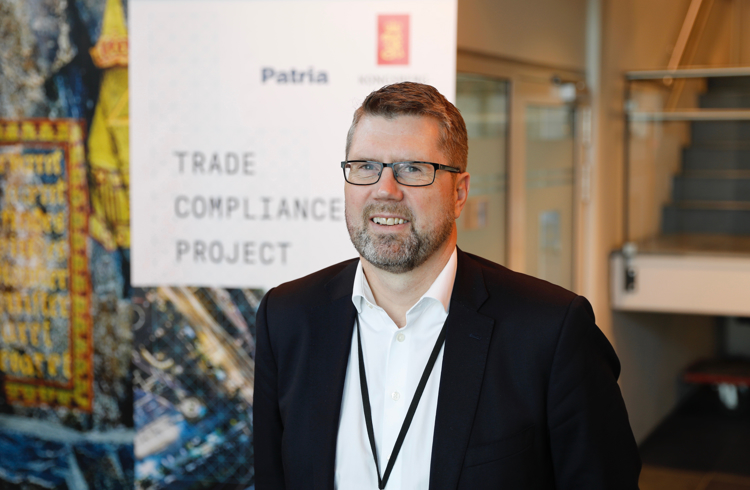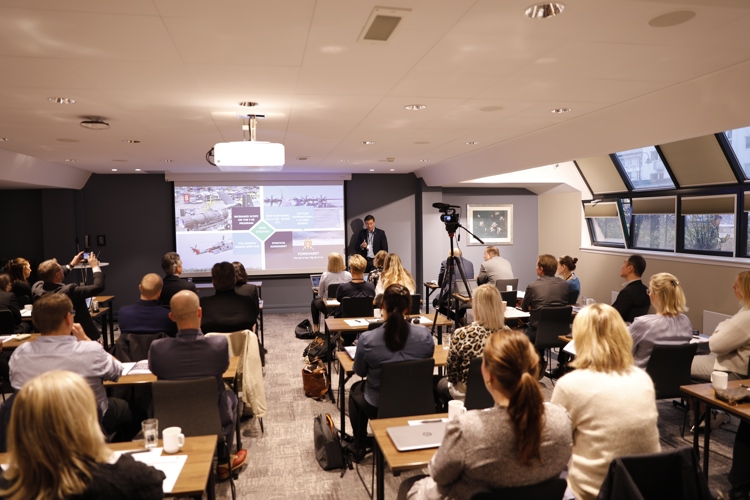
Building expertise in export control
Rosa Rosanelli is leading efforts to raise the level of expertise in export control within KONGSBERG and Patria.
-
Text:Ove Ronny Haraldsen
Ever since the KONGSBERG acquired Patria, there has been a close partnership aimed at sharing best practices and coordinating compliance. This partnership has also been regulated in a contract with Patria.
A key compliance area for both KONGSBERG and Patria is export control. This collaboration has also been important in connection with the integration of KONGSBERG Aviation Maintenance Services, where there is shared ownership between KONGSBERG and Patria.
KONGSBERG Maritime’s acquisition of Rolls-Royce Commercial Marine has also naturally led to a need for a holistic approach to this area. A project was set up by Corporate Compliance in collaboration with Patria, with the steering group now coordinating the further work.
Rosa Rosanelli, who now works at the Patria Belgium Engine Center (pbec), has been given the task of leading the project. pbec was previously owned by aim Norway.

“Compliance in relation to trading rules, including export control, is an important part of KONGSBERG’s guidelines on business ethics. Collaboration is one of our core values. Collaboration is something we are focusing on through this project in order to work on the sharing of good solutions, improvements and the building of expertise across the organisation,” says Håkon Lindteigen, Vice President of Corporate Compliance.
EXPORT CONTROL SEMINAR
In October, KONGSBERG and Patria held a joint seminar in Oslo, to which everyone involved in export control was invited. The focus was placed on various aspects of a diverse and, to some extent, complicated labyrinth of laws, regulations and sanctions.
Via video link, the ceos of both Patria and KONGSBERG stressed to the delegates the importance of doing things right. One of the examples highlighted was a supplier that had exported goods to a customer who had been placed on a US sanctions list.
In doing this, the company risked being excluded from the US market. The bank that had executed the transactions between the supplier and the customer was exposed to the same risk. The example shows the dramatic consequences that can result if the regulations regarding export controls and sanctions are not followed. The seminar was part of a new project that focuses on export control, which is now being rolled out across the organisation.

There are three key messages that every KONGSBERG employee should know: Each department has an export control manager who must be involved in all forms of activity that are of relevance to export control.
It all starts during the development phase in relation to classification and the choice of solutions or suppliers. Relevant export control legislation sets out the basis for classification and what must be licensed. The legislation also includes the transfer of knowledge, documentation and services. Mistakes in this area can have serious consequences for KONGSBERG.
FEW QUESTIONS TO ROSA

“What is your role in this project?”
“I am project manager and architect for the project, which means I am designing a holistic approach to export control for KONGSBERG and Patria.”
“Why is export control so important for KONGSBERG and Patria?
“Export control is important for all organisations involved with dual-use goods or defence-related articles, which also have a supply chain across international borders or customers in different countries. This applies to an even greater extent to companies that interact with counterparties in the usa or have public-sector agreements with the usa, and that position themselves as reliable international companies who take responsible business conduct seriously.”
“Do you have any examples of the consequences of not following the rules for export control?”
“There are many examples, and the issue is attracting more attention in the press. We are seeing more frequent enforcements in the usa, involving companies from both the usa and other countries, than we see here in Europe. But they do happen here too. The most recent case in the usa is the l3 Harris consent agreement, which led to them having to pay usd 13 million in compensation for a breach that was largely linked to licence processing and the company’s ability to present complete information to public bodies in the usa.
“There have also been many others, such as the flir consent agreement in 2018, which focused on the ability to limit access to technology that is subject to controls.
“There have also been many cases involving companies from countries other than the usa. The first was bae in 2011, which had to pay around usd 78 million. utc followed them in 2012 for breaches that mainly related to their units outside the usa. I was working for Pratt & Whitney-utc at the time, and we had to work hard to regain the trust of the US government and our customers using a system that was integrated into our business.
“I hope I can utilise this experience to prevent our companies from ending up in such situations, or at least ensure we are prepared and are able to show through our actions that we are aware of the requirements imposed on us, and that we are able to run an international business in a secure and safe manner.”
“What is the plan for the export control project at KONGSBERG?”
“The project will be rolled out in four phases. The first phase— planning—began back in late June. The next phase is assessments and gap analyses of each of the pilot companies. This will provide a basis for determining whether their procedures are adapted to the relevant risks and are proportionate.
“In this way, we will be able to identify and prioritise risk areas and establish a joint strategic approach to export control. In the third phase, we will put together a core team consisting of specialists in export control, establish a network and identify the solution that is most appropriate for the organisation. The final stage is implementation, where we implement the solutions for the pilot companies and carry out training.”
“What do you want to achieve through this project?”
“This project is a unique opportunity to adopt a new holistic approach to internal export control programmes. The approach will be risk-based; it will be effective because it is a natural part of the organisation; and it will be more harmonious between the various units. This also presents an excellent opportunity to utilise the skills and resources that the company already possesses in an even better way. We can create a team that can share information and perspectives, and that can be active during the implementation process and also act as a champion for export control in the future.”
“For KONGSBERG and Patria employees: what do they need to know about export control?”
“Thank you! That’s a good question, which helps me by asking another one: are you sure that those who think they are not directly linked to export control in any way are not affected by export control in their daily work? My experience is that the first step in every organisation is to realise that this is not just the responsibility of those who are involved with export control.
“This affects everyone. We all have a responsibility to protect our technology, and we are all affected, either directly or indirectly, by export control in our daily working lives. It might be a receptionist who decides that someone should be allowed into the building; it might be a business developer who must know which potential opportunities could entail risks relating to export control or require a licence. It might be a procurement officer who in some cases has to choose where the company should make its purchases based on restrictions, or it could be someone in the workshop who sees an unauthorised person in the area and has to act quickly. “Export control requires the entire business to work like a team. It presents a unique challenge because it can have major consequences for the company if we make mistakes, and because it affects so many parts of our organisation.”
“Are there any other issues you want to highlight?”
“Just that I have high expectations of companies like KONGSBERG and Patria, something I believe we all should have. We have the reputation, the skills and the knowledge that mean we can be proud of our work, and we must protect this as well as we can and in a way that is best for the company. Export control is often seen as something that holds us back. I believe export control should be a central part of the organisation, and it can even create value in areas where reputation and the company’s ability to handle complex requirements are important.”